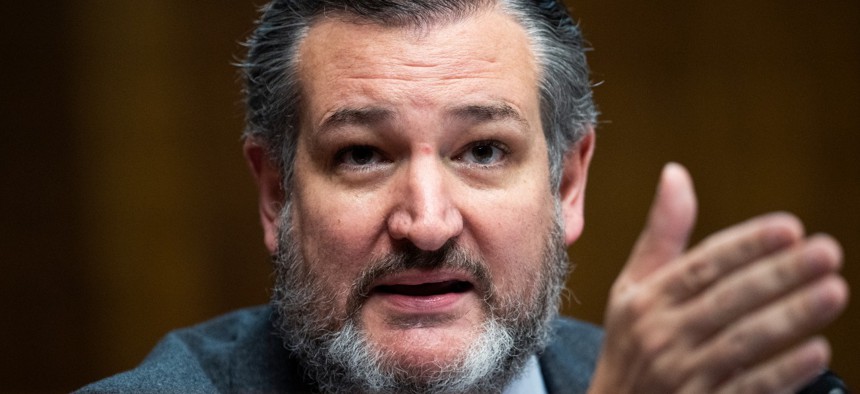
Sen. Ted Cruz, R-Texas, had placed the holds. Tom Williams/CQ-Roll Call, Inc via Getty Images
State Dept. Nominees Can Move Forward, Now That a GOP Senator Has Lifted His Holds
Sen. Ted Cruz is allowing the process to move forward now that Biden has reinstated sanctions on the company in charge of the natural gas pipeline between Russia and Germany.
A Republican senator has lifted his hold on President Biden’s State Department nominees, after the Biden administration took steps to rein in Russia.
The announcement from Sen. Ted Cruz, R-Texas, came after Biden announced sanctions on the company in charge of the natural gas pipeline between Russia and Germany (Nord Stream 2) which comes after he waived sanctions last year, prompting bipartisan objections from lawmakers. Cruz said Biden “made the right decision,” which “should be followed by additional steps inside the Biden administration and in Congress to permanently lock in sanctions” to deter Russian President Vladimir Putin, who has ordered an assault on Ukraine.
Cruz, a member of the Senate Foreign Relations Committee, has been creating roadblocks over the last almost year for Biden’s State Department nominees to assert pressure on the Biden administration regarding the pipeline.
“After the administration granted the waivers, Sen. Cruz committed to using all prerogatives available to him as a U.S. senator to reverse this decision, including holding certain State Department nominees,” said a press release from Cruz’s office on Wednesday. “After engaging with the administration and following today’s announcement, Sen. Cruz will lift these holds.” The press release does not specify which nominees these are exactly and Cruz's office declined to comment.
In March 2021, Cruz placed a hold on the nominations of Wendy Sherman to be deputy secretary of State and Brian McKeon to be deputy secretary of State for management and resources. He then expanded the holds–often a secretive process– to include more State Department nominees and U.S. ambassadors, as reported by NBC News and The New York Times.
Cruz and Sen. Pat Toomey, R-Pa., sent a letter to the chairs of the Senate Foreign Relations and Banking committees in September outing their conditions to lift their holds.
In December Cruz blamed the Senate Democrats, specifically, on the Senate Foreign Relations Committee, for not holding hearings on multiple ambassador nominations, therefore there are “no Republican objections,” but “there are a number of nominees who have been nominated, had hearings on whom I have holds.” Later in the month, he lifted his hold on 32 nominees, in order to get a vote on his legislation to sanction the pipeline, he said on the Senate floor on January 13.
A “hold” is essentially a senator saying, “If you try to confirm this nominee through unanimous consent, I will object,” and therefore the process takes longer, said Joshua Huder, senior fellow at the Government Affairs Institute at Georgetown University.
Senators are “not forthcoming about who [the holds] are often or what they’re for in some circumstances,” which has happened throughout Senate history, he told Government Executive. “It’s all secret and that’s one of the frustrating things about it.”
“Joe Biden has a ton of nominations that have holds on them,” said Huder. “It’s not just State Department officials from Ted Cruz; it’s tons and tons and tons of other officials that Republicans are bottling up.” There are lots of reasons senators do not want to make their holds public, “but when they do make it public it’s obviously for political reasons,” Huder said.
Max Stier, president and CEO of the nonprofit Partnership for Public Service, told Government Executive on Friday the Senate is “designed to operate smoothly only when there is unanimous consent,” which is not the case when holds are issued. Also, other senators could still place holds on nominees or other senators could have holds on the same nominee, he noted.
“It used to be the case that there was no requirement that [holds] be made public,” and then there were changes in the mid-2000s “there were some legal rule changes to try to make more transparency around holds…but there were loopholes,” Stier said.
“I think this is an example where we’re seeing why having leaders at the State Department matters,” he continued. “We’ve got an incredibly important war going on in Europe and we need to have leaders at the State Department in place and at other agencies to manage the U.S. response effectively.” He repeated the Partnership’s stance that the number of Senate-confirmed positions should to be reduced to help fix the “broken” process.
The Partnership and The Washington Post are tracking the nomination and confirmation process for 799 key positions, which includes Cabinet secretaries, general counsels, ambassadors, chief financial officers and others.
For State Department positions, 80 were confirmed, 50 are at the Senate, 37 have no nominee and 98 are holdovers, as of Friday afternoon. These numbers have fluctuated since Cruz’s holds began.
When asked about the pace of Biden’s nominations in October, White House Press Secretary Jen Psaki said while they have “made progress” starting at the time of the transition on putting qualified nominees forward, “there have been unprecedented delays, obstruction, holds on qualified individuals from Republicans in the Senate.”
The obstruction “has prevented qualified nominees from being in vital positions, whether it’s in the national security roles; in the Defense Department; the State Department, where we’ve seen ambassadors held for weeks and months, at times; or even our economic nominees, who are unquestionably qualified but have been unable to move forward and serve in these positions,” she said.
The Partnership released a report ahead of the Biden administration’s one-year anniversary that looked at Biden’s pace of nominations and confirmations for various categories of positions, how it compares to historical precedent and the unique circumstances that Biden faced, from the pandemic to the unprecedented presidential transition to former President Trump’s second impeachment.







